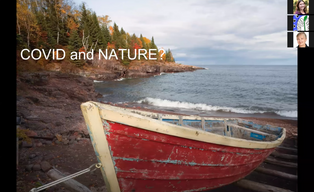When Life Gives You Lemons: Bakken Center Webinars are a Bright Spot in a Dreary World
- Andy Steiner
- Jan 15, 2021
- 5 min read
Updated: Jul 28, 2021
Before the global pandemic forced the world into lockdown, staff at the Earl E. Bakken Center for Spirituality & Healing created a series of webinars — free, interactive online opportunities to hear Center-connected experts discuss the latest topics in health and wellbeing.

The Center’s first webinars were well-attended by mostly University staff, students, faculty, and alumni on their lunch breaks or at home in the evenings, says Sue Nankivell, director of business development and community relations.
“At our first webinar, there were 60 people. We were excited to see so many registrations. It went really well.” Then, unexpectedly, COVID hit, and the webinars’ attendance jumped dramatically. “Since COVID, there have been times when we have more than 1,600 people registered for a single program,” Nankivell says.

Because online programming is, by its very nature, COVID-safe, Center staff seized the opportunity to expand the webinar offerings. Molly Buss, Bakken Center community relations program and events manager and the webinars’ host, says that she and her colleagues brainstormed about how to expand the series’ offerings.
“We expanded our thinking, looking for the most timely topics, things that really could help participants, especially during a pandemic, where you don’t know what will happen next.”
For the organizing team, Nankivell explains, expanding the webinar series’ offerings meant thinking outside of the box, developing programming that would appeal to a larger cross-section of participants and further advance the Center’s mission.
“The idea in coming up with new programming was not to be formulaic or rigid,” she says. Planners had to be flexible and fast on their feet. “Our goal is to provide wellbeing resources in a timely way and be responsive to what is evolving in our world.”
Smooth shift
The pandemic also meant that popular in-person Bakken Center classes, like the weekly “Stress Busters” series and the popular eight-week “Mindfulness-based Stress Reduction” courses, had to shift online.

This required instructors to be flexible and creative, says Mariann Johnson, mindfulness and wellbeing instructor at the Center.
“Like everybody else that provides training and education, we had to reconsider how to deliver what we usually deliver in person in a quality fashion online. Fortunately we had some experience with the webinars we’d already been hosting under our belts. So for us the transition wasn’t actually so difficult.”
In the end, Johnson adds, program participants had an easier time making the shift than anyone expected.
“We all thought what we’d miss the most were those times spent lingering before and after class and getting to know each other more informally,” she says. To replicate that experience, “We’ve opened up the webinars earlier. A lot of times participants will come early and chat with each other before the program starts.”
Just like webinar series offerings, the mindfulness classes have also seen a significant attendance spike. Before the pandemic, Johnson says, around 30 people usually attended “Stress Busters” Monday sessions, which will be called "Mindful Mondays" going forward. When the program was moved online, interest soared.
Spread the message
The original webinar series grew out of a desire to deliver the work of the Bakken Center to as many people as possible, Nankivell says. “For quite a while, I had been wanting to create this series of free webinars to take the treasure trove of resources and expertise and passion at the Center to a broader audience.”
While it’s hard to feel happy about living through a global pandemic, Nankivell believes that the jump in webinar attendance the crisis has fueled is one bright spot in an otherwise grim reality.
“If there is a positive for us that came out of this pandemic in particular, it is that we now realize that we can reach a greater breadth of people in this way. Remote learning means that people who are at home or otherwise not near the University can now participate in our programs in a way that they could never could have before.”
While many of the webinar attendees still have links to the University, more than 25% now come from across the state and around the world.
“At the beginning of a webinar, I’ll invite participants to introduce themselves,” Buss says. “When I ask them to say where they’re coming from, we’ll meet people from places like the Philippines and India.”
Organizers are not just excited about expanding the webinars’ reach worldwide; they’re also happy to learn that their programs are reaching people who might not have been able to access in-person programming.
“Many people tell us, ‘I wouldn’t be able to attend this if it wasn’t offered for free,’” Nankivell says. “It means a lot to us to be able to support people who wouldn’t be able to get the information otherwise.”
Online programming increases physical accessibility, Buss adds. She tells the story of an 87-year-old woman who’s been essentially shut in at her senior-living facility since the pandemic broke out.
“She reached out and asked us to do a private session for herself and other residents,” Buss says. Center staff held a special private session for the woman and her neighbors. It was a breakout success, Buss says. “Now her entire senior living facility has joined us. It’s a great outcome.”
Right for the times
"The webinars’ accessible, useful messages feel like the perfect balm for a stressed, edge-of-your seats world," Nankivell says.
Enthusiastic post-session comments from participants underline this truth, including:
•"Thank you for sharing these inspiring webinars; they continue to empower me to keep a positive attitude and persevere during challenging times."; and
•"Profound gratitude for your course offerings, especially during COVID-19 and polarized political times. Thank you! Thank you!"
Nankivell believes that the webinars’ timely topics may be the reason for this enthusiasm. “We have featured everything from ‘Mindfulness during challenging times’ to ‘Purpose and uncertainty’ to ‘Self-Acupressure for stress management.’ We also offered one on sleep and wellbeing and one on cooking at home.”
As we head into what could be a long, dark winter, Buss adds that she and the other planners are focused on developing webinars that offer a source of hope and inspiration.
“Now, more than ever, people are feeling fear and anxiety and isolation,” she says. “We have a number of webinars coming up that will address some of those immediate issues. They could be a helpful survival tool in tough times.”
Johnson agrees. “Most of us right now, especially given all of the stressors in our days, need some helpful tools to remind us of our natural capacity for inner wisdom. These programs are designed to do that, and they have the power to help so many people.”














Comments